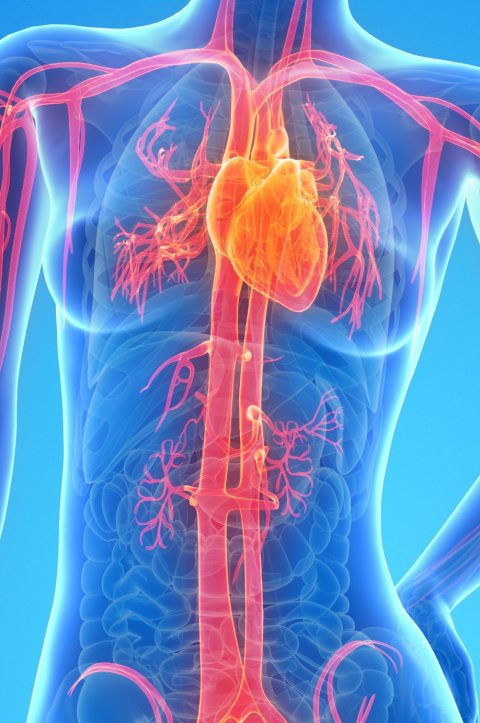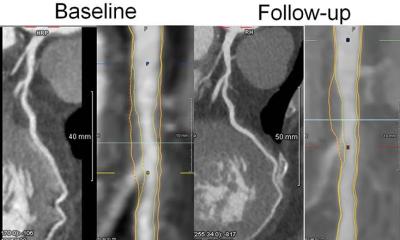News • Higher risk stroke and heart attack
Covid infection accelerates vascular aging – especially in women
A Covid infection, particularly in women, may lead to blood vessels aging around five years, according to new research.

© Sebastian Kaulitzki – stock.adobe.com
The study was published in the European Heart Journal.
Blood vessels gradually become stiffer with age, but the new study suggests that Covid could accelerate this process. Researchers say this is important since people with stiffer blood vessels face a higher risk of cardiovascular disease, including stroke and heart attack.
The study was led by Professor Rosa Maria Bruno from Université Paris Cité, France. She said: “Since the pandemic, we have learned that many people who have had Covid are left with symptoms that can last for months or even years. However, we are still learning what’s happening in the body to create these symptoms. “We know that Covid can directly affect blood vessels. We believe that this may result in what we call early vascular ageing, meaning that your blood vessels are older than your chronological age and you are more susceptible to heart disease. If that is happening, we need to identify who is at risk at an early stage to prevent heart attacks and strokes.”
The study included 2,390 people from 16 different countries (Austria, Australia, Brazil, Canada, Cyprus, France, Greece, Italy, Mexico, Norway, Turkey, UK and US) who were recruited between September 2020 to February 2022. They were categorised according to whether they had never had Covid, had recent Covid but were not hospitalised, hospitalised for Covid on a general ward or hospitalised for Covid in an intensive care unit.
Women mount a more rapid and robust immune response, which can protect them from infection. However, this same response can also increase damage to blood vessels after the initial infection
Rosa Maria Bruno
Researchers assessed each person’s vascular age with a device that measures how quickly a wave of blood pressure travels between the carotid artery (in the neck) and femoral arteries (in the legs), a measure called carotid-femoral pulse wave velocity (PWV). The higher this measurement, the stiffer the blood vessels and the higher the vascular age of a person. Measurements were taken six months after Covid infection and again after 12 months. Researchers also recorded demographic information such as patient’s sex, age and other factors that can influence cardiovascular health.
After taking these factors into consideration, researchers found that all three groups of patients who had been infected with Covid, including those with mild Covid, had stiffer arteries, compared to those who had not been infected. The effect was greater in women than in men and in people who experienced the persistent symptoms of long Covid, such as shortness of breath and fatigue.
The average increase in PWV in women who had mild Covid was 0.55 meters per second, 0.60 in women hospitalised with Covid, and 1.09 for women treated in intensive care. Researchers say an increase of around 0.5 meters per second is “clinically relevant” and equivalent to ageing around five years, with a 3% increased risk of cardiovascular disease, in a 60-year-old woman.

Image source: European Heart Journal
People who had been vaccinated against Covid generally had arteries that were less stiff than people who were unvaccinated. Over the longer term, the vascular ageing associated with Covid infection seemed to stabilise or improve slightly.
Professor Bruno said: “There are several possible explanations for the vascular effects of Covid. The Covid-19 virus acts on specific receptors in the body, called the angiotensin-converting enzyme 2 receptors, that are present on the lining of the blood vessels. The virus uses these receptors to enter and infect cells. This may result in vascular dysfunction and accelerated vascular ageing. Our body’s inflammation and immune responses, which defend against infections, may be also involved.
“One of the reasons for the difference between women and men could be differences in the function of the immune system. Women mount a more rapid and robust immune response, which can protect them from infection. However, this same response can also increase damage to blood vessels after the initial infection. Vascular ageing is easy to measure and can be addressed with widely available treatments, such as lifestyle changes, blood pressure-lowering and cholesterol-lowering drugs. For people with accelerated vascular ageing, it is important to do whatever possible to reduce the risk of heart attacks and strokes.”
Professor Bruno and her colleagues will continue to follow the participants over the coming years to establish whether the accelerated vascular ageing they have found leads to an increased risk of heart attacks and strokes in the future.
In an accompanying editorial, Dr Behnood Bikdeli from Harvard Medical School, Boston, USA and colleagues said: “Although the acute threat of the Covid-19 pandemic has waned, a new challenge emerged in its aftermath: post-acute Covid-19 syndrome. Defined by the World Health Organization as symptoms appearing three months post-infection and lasting at least two months, studies suggest that up to 40% of initial Covid-19 survivors develop this syndrome.
“This large, multicentre, prospective cohort study enrolled 2390 participants from 34 centres to investigate whether arterial stiffness, as measured by PWV, persisted in individuals with recent Covid-19 infection. […] sex-stratified analyses revealed striking differences: females across all Covid-19-positive groups had significantly elevated PWV, with the highest increase (+1.09 m/s) observed in those requiring ICU admission. The CARTESIAN study makes the case that Covid-19 has aged our arteries, especially for female adults. The question is whether we can find modifiable targets to prevent this in future surges of infection, and mitigate adverse outcomes in those afflicted with Covid-19-induced vascular ageing.”
Source: European Society of Cardiology
18.08.2025











